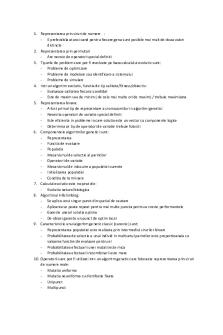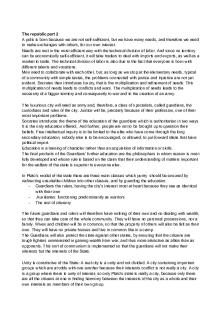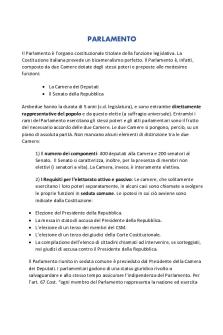The republic part 2 - ottimo riassunto con tante info PDF

| Title | The republic part 2 - ottimo riassunto con tante info |
|---|---|
| Course | History of Political Thought (Distributive Justice) |
| Institution | Libera Università Internazionale degli Studi Sociali Guido Carli |
| Pages | 5 |
| File Size | 72.1 KB |
| File Type | |
| Total Downloads | 21 |
| Total Views | 156 |
Summary
ottimo riassunto con tante info...
Description
The republic part 2 A polis is born because we are not self-sufficient, but we have many needs, and therefore we need to make exchanges with others, for our own interest. Needs are met in the most efficient way with the technical division of labor. And since no territory can be economically self-sufficient, it will take traders to deal with imports and exports, as well as a market to trade. The technical division of labor is also due to the fact that everyone is born with different talents and vocations. Men need to collaborate with each other, but, as long as we stop at the elementary needs, typical of a community with simple tastes, the problems connected with justice and injustice are not yet evident. Socrates then introduces luxury, that is the multiplication and refinement of needs. This multiplication of needs leads to conflicts and wars. The multiplication of needs leads to the necessity of a bigger territory and consequently to war and to the creation of an army. The luxurious city will need an army and, therefore, a class of specialists, called guardians, the custodians and rules of the city. Justice will be, precisely because of their profession, one of their most important problems. Socrates introduces the theme of the education of the guardians which is authoritarian in two ways. It is the only education offered;. And further, people are not to be brought up to question their beliefs. Free intellectual inquiry is to be limited to the elite who have come through the long secondary education; nobody else is to be encouraged, or allowed, to put forward ideas that have political import. Education is a training of character rather than an acquisition of information or skills. The final products of the Guardians' further education are the philosophers in whom reason is most fully developed and whose rule is based on the claim that their understanding of matters important for the welfare of the state is superior to everyone else. In Plato’s model of the state there are three main classes which purity should be ensured by redirecting unsuitable children into other classes, and by guarding the education: - Guardians the rulers, having the city's interest most at heart because they see as identical with their own - .Auxiliaries: functioning predominantly as warriors - The rest of citizenry The future guardians and rulers will therefore have nothing of their own and no dealing with wealth, so that they can take care of the whole community. They will have no personal possessions, nor a family. Wives and children will be in common, so that the property of others will also be felt as their own. They will have no private houses and live in common like in a camp. The Guardians will also protect the state against other states, by ensuring that the citizens are tough fighters uninterested in gaining wealth from war, and thus more attractive as allies than as opponents. This sort of communism is implemented so that the guardians will not make their interests but the interests of the State. Unity is constitutive of the State: A real city is a unity and not divided. A city containing important groups which are at odds with one another because their interests conflict is not really a city. A city is a group where there is unity of interest; so only Plato's state is really a city, because only there are all the citizens at one in finding harmony between the interests of the city as a whole and their own interests as members of their own group.
Actual cities are by this test not really cities, because they contain groups that see themselves as having conflicting interests (like rich and poor). So for Plato, a pluralistic society is a failure. The ideal state is based on education not on laws and rules. In fact according to Plato if the education is properly maintained, there will be no need for minor regulations or rules. On the other hand, if the citizens' education is neglected, no amount of regulations will produce a well-ordered state. The only necessary laws for Plato are laws for the production of rulers, not for defining citizens' rights and duties. The education of Guardians replaces a constitution, or a code of statutes. There is no need of bill of rights, or of written laws, as safeguards against exploitation and abuse, because the rulers will be good people who will not exploit or abuse the other citizens The state can imply some manipulation of the ruled by the rulers The rulers are justified in using lies 'medicinally' whereas the other citizens are in the wrong if they lie to them. The idea of a just city is realized only when there is harmony between the classes of citizens. Having now in theory founded the ideal state, Socrates proceeds to try to determine the essential virtues that may be said to characterize it (the Four Cardinal Virtues): wisdom, courage, temperance, and justice: - Wisdom in the state must be said to reside in the class of rulers, for, by definition, they rule by counseling the other classes and themselves. They are the best of the Guardians, having all their lives been nurtured and educated to assume their place as rulers, and they are the most experienced and oldest of the citizens. - The second virtue, courage, may best be found in that class which has specifically been inculcated with courage during the entire career of the members of that class: These are the auxiliaries. - The third virtue, temperance (discipline) is a bit more difficult to analyze because it seems to permeate the other virtues. Temperance is found in the ordering or controlling (tempering) of certain pleasures or desires in the individual; the temperate man is said to be master of himself. If we extend this to the state, in order for it to regulate itself, we see that the state has to run harmoniously. Every class in the state has to cooperate with the other classes. Having determined three of the four virtues, only the fourth virtue, justice, remains. We recall that the responsibility of each member of each class is that he attends strictly to the business of that class, that each member fulfills the job assigned him. Since we have determined that each citizen is rewarded within the confines of his class it follows that meddling and exchange between classes turns out to be the worst evil. Responding to an objection by Adimanto, according to which the guardians are not happy because, in fact, the education, socialization and economic organization of their life make it impossible for them to pursue personal interests related to property, freedom of movement and kind of relationships with others. Socrates replies that happiness for the guardian consists precisely in fulfilling his duty since he was generated precisely for this particular role: to ensure the perpetuation of justice. Once justice is found in the right state, it is sought in the just man: Socrates demonstrates that justice in the state is the same as in the individual, since the structure of the soul is similar to that of the city.
Plato describes the soul as having three parts, which he calls reason, spirit, and appetite or desire. - Reason: This is the part by virtue of which we learn and reason. It has two main functions. One is that of searching for the truth and increasing one's knowledge; the other function is to rule in the soul. (It corresponds to the Guardians who are to rule the other two classes.) When reason functions well it has wisdom - Spirit; 'the part that loves honour and winning' . Plato seems to be talking about two very different kinds of things. One is a tendency to aggression and violence. However, it is the part that delights in victory and honours. Sometimes is like reason in demanding a perception of what is acceptable to the person as a whole. (Spirit is analogous to the Auxiliaries in the state; their characters have been so trained that they repudiate aims that offend against their ideals, but they lack reasoned understanding of their way of life and its basis). When it functions well it has courage. - Desire: thought of as manifold and often chaotic because desire can fix on objects of just about any kind; there is nothing that unifies all cases of desiring except that some particular thing is sought for. (This is meant to be parallel to the productive class in the state, who do not have any unifying ideal but are each set on his or her own particular aim.) When it functions well it has temperance. The person is just because of the fact that each of his or her parts is functioning properly and 'doing its own'.A person is just, then, if each part is acting virtuously and if reason is ruling, spirit is ensuring that reason has adequate motivational backing and desire is accepting control by the other two rather than pressing its own particular claims. By using this theory of the tripartite soul, Plato gives an account of how man can be virtuous. A just man is one whom the three parts of his soul play their proper roles and are in harmony with one another. To the objection that Psychic harmony is a condition of one’s soul and that thus doesn’t entail ordinary justice which concerns behaviour to other people, Plato responds by stating that a person with an harmonious soul will be incapable of acting unjustly because the desire that come with such a soul will lead to just actions. The Platonically just man would lack most discernible reasons that lead people to be ordinarily unjust. (because he’s not interested for example in money) Plato’s theory of justice is thus said to be more agent-centered, meaning that the right thing to do is identified as the kind of thing done by the good person (the good man is the norm for just action; he can tell you what the right thing to do is, because he is just. He identifies the just action thanks to inner harmony), rather than an act centered, meaning that the good person is the person who does what he or she ought to do, the person that performs the right actions. The whole progress of Books 2 through 4 has been an attempt to build up a notion of the just agent. This process began even in Glaucon's speech, where he made the high point of his case against justice the comparison of the lives of just and unjust men. Plato has, in Books 2-4, through the extended soul-state comparison, concentrated on the individual's soul, goodness, and virtues. He has set aside the question of just acts to consider in the environment that would produce and reinforce good people, the education that would bring them about, the proper artistic surroundings that they should have, and the psychological basis for all this. He has made the just agent primary, not the question of just actions which dominated the concerns of Thrasymachus, and of Glaucon and Adeimantus.
Benefits of justice 1) When States lose their unity, they degenerate -- becoming timocracies, oligarchies, democracies, tyrannies -- conditions whose unhappiness is apparent In his Republic, Plato identifies four. political regimes which are considered as degenerations of the ideal State: - Timocracy: happens when the guardians and the producers start to include people of inferior nature. These people no longer cultivate only virtues but also pursue wealth. A change occurs in the constitution whereby leaders are allowed to pursue their personal interests. The governors of this regime value power which leads them to acquire it by means of force instead of by using their intellectual capacities. - Oligarchy: This is a system of government that is composed of two classes. Rich and poor people, where rich govern the poor. People are allowed to own property and accumulate money. Because the money provides for pleasures, it eventually becomes more valued over virtue - Democracy: Freedom reigns. The lower class of the poor grows and the poor become winners. Everyone is free to do as they wish. The democratic man has many unnecessary desires and his life has no aim or priorities. He is just interested in what he can buy with his money. - Tyranny: a regime where society without discipline and where chaos reigns. Tyranny establishes itself when the democratic regime loses control as a result of too much freedom. The tyrant is of the worst kind of a person. He is the most unjust and lawless. He has a soul enslaved to one master desire, lust, which produces a chronic state of unsatisfied need. 2) The just person's life is the philosophical life. The philosopher will have experienced all three types of pleasure, whereas the soldier and merchant lack the inclination and competence to enable them to taste the philosopher's pleasures. And wisdom and reason are the philosopher's special field of competence. So his judgement is the most authoritative, and since he prefers his own life, the life of seeking wisdom is the most pleasant. 3) The philosopher's pleasures are the only true, real ones. Activities that most people think are pleasant are not really so, only apparently, and owe the appearance to a contrast with pain. What fills the soul is more real and true than what fills the body. So the philosopher's pleasures are the most real. When reason attains its proper pleasures, then all parts will be satisfied Justice has as its consequence a pleasant and happy life, and thus is desirable both for itself and for its consequences, and belongs rightfully in the second class of goods. Happiness for plato is a result of the state of one’s soul and does not depend on external goods. Implementation problem Socrates also addresses the problem of how the ideal city can come into being. Socrates admits that this is the most difficult criticism to address. Then he explains that the theoretical model of the just city they constructed remains valid for discussing justice and injustice even if they cannot prove that such a city can come to exist and functions as an ideal for the just person to try to realize it in his life. The just state can only be brought about by just people, but just people are the products only of a just state, such as nowhere actually exists....
Similar Free PDFs

Passiv - ottimo
- 5 Pages

The Republic China notes 2 8 18
- 6 Pages

The Republic Book X
- 2 Pages

Judging the judges part 2
- 3 Pages

The Odyssey - Part 2 transcript
- 6 Pages

Info - Info
- 3 Pages

Grile 2-3 info
- 6 Pages

Catedra 2 info 2 - asdadasda
- 6 Pages

Info 2 Stichpunkt Zusammenfassung
- 14 Pages

Research quiz 2 info
- 1 Pages

Biomembran Fluidität info 2
- 15 Pages
Popular Institutions
- Tinajero National High School - Annex
- Politeknik Caltex Riau
- Yokohama City University
- SGT University
- University of Al-Qadisiyah
- Divine Word College of Vigan
- Techniek College Rotterdam
- Universidade de Santiago
- Universiti Teknologi MARA Cawangan Johor Kampus Pasir Gudang
- Poltekkes Kemenkes Yogyakarta
- Baguio City National High School
- Colegio san marcos
- preparatoria uno
- Centro de Bachillerato Tecnológico Industrial y de Servicios No. 107
- Dalian Maritime University
- Quang Trung Secondary School
- Colegio Tecnológico en Informática
- Corporación Regional de Educación Superior
- Grupo CEDVA
- Dar Al Uloom University
- Centro de Estudios Preuniversitarios de la Universidad Nacional de Ingeniería
- 上智大学
- Aakash International School, Nuna Majara
- San Felipe Neri Catholic School
- Kang Chiao International School - New Taipei City
- Misamis Occidental National High School
- Institución Educativa Escuela Normal Juan Ladrilleros
- Kolehiyo ng Pantukan
- Batanes State College
- Instituto Continental
- Sekolah Menengah Kejuruan Kesehatan Kaltara (Tarakan)
- Colegio de La Inmaculada Concepcion - Cebu




